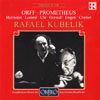Orff Prometheus
Regarded by some as one of Orff’s finest scores, this powerful piece of music-theatre makes a first appearance in the catalogue, in a superlative live recording
View record and artist detailsRecord and Artist Details
Composer or Director: Carl Orff
Genre:
Opera
Label: Orfeo
Magazine Review Date: 11/2000
Media Format: CD or Download
Media Runtime: 132
Mastering:
ADD
Catalogue Number: C526992I

Tracks:
| Composition | Artist Credit |
|---|---|
| Prometheus |
Carl Orff, Composer
Bavarian Radio Chorus Bavarian Radio Symphony Orchestra Carl Orff, Composer Colette Lorand, Io, Soprano Erika Rüggeberg, Chorführerin I, Soprano Fritz Uhl, Hermes, Tenor Heinz Cramer, Hephaistos, Bass Isolde Mitternacht, Chorführerin II Josef Greindl, Kratos, Bass Julia Falk, Chorführerin III Kieth Engen, Okeanos, Bass Rafael Kubelík, Conductor Roland Hermann, Prometheus, Tenor |
Author: Michael Stewart
For a composer responsible for one of the most popular pieces of music to have emerged last century, Carl Orff’s contribution to and influence upon 20th-century music remains largely unrecognised and unappreciated. The current catalogue sports no fewer than 75 or so recordings of Carmina burana, and a sprinkling of recordings of Catulli carmina, Trionfo di Afrodite and the operas Der Mond, Antigonae and Die Kluge. Recordings of his lesser-known works have occasionally appeared over the years, but we currently have no recordings of the operas Ein Sommernachtstraum, Die Bernauerin, the choral works Nanie und Dithyrambe and Rota, or of the stage work Oedipus der Tyrann which, together with Antigonae and Prometheus, Orff considered his true and greatest legacy.
Prometheus was composed in 1968 and was the last of Orff’s trilogy of Greek dramas. Unlike the preceding stage works (Antigonae and Oedipus) Orff made the decision to set the text in Greek, as opposed to Holderlin’s German adaptations which he had used in the previous two works. The result is a powerful piece of music-theatre that aspires to recreate the spirit of Greek classical theatre while at the same time reinterpreting it afresh for modern times and audiences. Prometheus is neither opera nor oratorio, but rather an individual musical interpretation of Aeschylus’s original tragedy.
Listeners familiar with Carmina burana, and even Catulli carmina, are in for an unsettling experience, for with Prometheus Orff eschews the opulence and grandeur of the former for a far more sparse and arid musical landscape. Interspersed among the musical episodes (or perhaps even vice-versa) are large sections of text delivered Sprechstimme-style. Listening to this work anew after a gap of several years, I was struck by the modernity of Orff’s language here – Xenakis and even Tavener often come to mind. As the booklet-notes point out, ‘nothing recalls the big opera orchestra, everything is focused on the transition from noise to notes and on rhythmic elements … ’. Orff’s orchestration is highly individual, too, with only wind and double-basses supporting an extensive array of percussion instruments. The work is not without flaws: especially when heard (as here) as a sound recording of a concert performance, it could be said to be neither fish nor fowl, neither opera nor even musical theatre, but the work has an undeniable power and there are rewarding moments throughout this fascinating score, which is regarded by many Orff admirers as his finest achievement.
The live recording, made in 1975 in the presence of the composer in Munich, is a veritable tour de force, with Rafael Kubelik procuring from his musicians superlative performances throughout, not least Roland Hermann’s extraordinarily intense and powerful performance as Prometheus. The recorded sound is exceptionally fine. Well worth investigating.'
Prometheus was composed in 1968 and was the last of Orff’s trilogy of Greek dramas. Unlike the preceding stage works (Antigonae and Oedipus) Orff made the decision to set the text in Greek, as opposed to Holderlin’s German adaptations which he had used in the previous two works. The result is a powerful piece of music-theatre that aspires to recreate the spirit of Greek classical theatre while at the same time reinterpreting it afresh for modern times and audiences. Prometheus is neither opera nor oratorio, but rather an individual musical interpretation of Aeschylus’s original tragedy.
Listeners familiar with Carmina burana, and even Catulli carmina, are in for an unsettling experience, for with Prometheus Orff eschews the opulence and grandeur of the former for a far more sparse and arid musical landscape. Interspersed among the musical episodes (or perhaps even vice-versa) are large sections of text delivered Sprechstimme-style. Listening to this work anew after a gap of several years, I was struck by the modernity of Orff’s language here – Xenakis and even Tavener often come to mind. As the booklet-notes point out, ‘nothing recalls the big opera orchestra, everything is focused on the transition from noise to notes and on rhythmic elements … ’. Orff’s orchestration is highly individual, too, with only wind and double-basses supporting an extensive array of percussion instruments. The work is not without flaws: especially when heard (as here) as a sound recording of a concert performance, it could be said to be neither fish nor fowl, neither opera nor even musical theatre, but the work has an undeniable power and there are rewarding moments throughout this fascinating score, which is regarded by many Orff admirers as his finest achievement.
The live recording, made in 1975 in the presence of the composer in Munich, is a veritable tour de force, with Rafael Kubelik procuring from his musicians superlative performances throughout, not least Roland Hermann’s extraordinarily intense and powerful performance as Prometheus. The recorded sound is exceptionally fine. Well worth investigating.'
Discover the world's largest classical music catalogue with Presto Music.

Gramophone Digital Club
- Digital Edition
- Digital Archive
- Reviews Database
- Full website access
From £8.75 / month
Subscribe
Gramophone Full Club
- Print Edition
- Digital Edition
- Digital Archive
- Reviews Database
- Full website access
From £11.00 / month
Subscribe
If you are a library, university or other organisation that would be interested in an institutional subscription to Gramophone please click here for further information.




